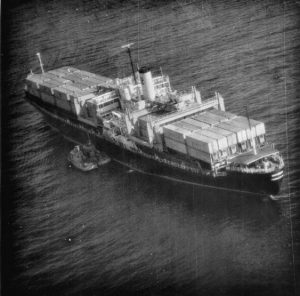Forty-five years ago the United States military fought its last battle of the Indochinese wars, soon after the Khmer Rouge began sacking Phnom Penh and illegally seized the SS Mayaguez, sailing through the Gulf of Siam.
Washington launched a rescue operation, sending in the Marines. They recaptured the U.S. merchant vessel and attacked the island of Koh Tang, prompting Pol Pot to release the hostages.
But resistance on the island was strong. Between May 12 and 15, 1975, helicopters were downed and marines fought a pitched battle before evacuating. In all, 41 U.S. servicemen were killed in an operation which rescued 40 people.
Three Marines were left behind – an anathema in the U.S. military – and it is widely believed they survived for some time before being captured and bludgeoned to death by the Khmer Rouge and this was potentially a political embarrassment.
Their names are the last listed on the Vietnam War Memorial in Washington.
That, however, is where the recognition stopped. Military bureaucracies are not known for their flexibility and as far as the boffins in the Pentagon were concerned the Vietnam War had ended on January 27, 1973, when President Nixon signed the Paris Peace Accords.
Those who took part in the rescue were subsequently sworn to secrecy over an incident described by President Gerald Ford, who feared another Pueblo Incident, as a “humiliating withdrawal” and a United States being seen as a helpless giant.
Thus the battle for the Mayaguez was relegated to memory as an “incident” and commemorations lost amid the spate of anniversaries around this time of year marking communist takeovers of South Vietnam, Cambodia and Laos in 1975.
In a bid to address history’s anomalies and win credit where due, the Fainting Robin Foundation is spearheading efforts to have Marine SSgt. Fofo Tuitele awarded the Congressional Medal of Honor for his “heroic efforts during the last battle of the Vietnam War.”
“Most of us were 18 to 21 year-old young men, scared shitless, experiencing the throes of heavy combat,” wrote Al Bailey of the 2/9 3rd Marine Corp Division in a supporting testimonial.
“By just his presence and calm demeanor SSgt. Fofo Tuitele buoyed us up past paralyzing fear… He saved many lives that day and warrants the Medal of Honor for his actions on Koh Tang.”
James D. Keith, Golf Company Executive Officer, was also among the many who submitted supporting testimonials on Tuitele’s behalf, detailing his bravery in taking the fight to the Khmer Rouge cadre.
“It was obvious to me that SSgt Tuitele, once ensuring our northern perimeter was securely defended, took it up on himself to move through the Khmer Rouge position and take out the machine gun position that had been wreaking havoc upon our position.”
LCpl. Fred B. Morris, also of Golf Company, was typical of the testimonials saying, “many more lives would have been lost for not the actions of SSgt Tuitele.”
Tuitele was awarded the Navy Commendation Meal with Combat Device for his actions but an application by Fainting Robin for the Correction of Military Record describes this as “woefully inadequate.”
There is no shortage of battles fought, lost and won, from all sides of the decades of Indochinese conflicts and fields littered with the remains of those who stepped-up and deserve better.
From an American perspective, as the author John L. Frisbee once noted, the Mayaguez Incident was no more than a footnote in most histories of the period.
“It and the men who carried out the rescue deserve better than that. At a time when its resolve was in doubt, the US showed the world that it would pay whatever price was necessary to protect its citizens and preserve its national honor.”
And for that, by all accounts of those who were there, Tuitele deserves his recognition too.
Luke Hunt is the author of The Punji Trap and can be followed on Twitter @lukeanthonyhunt

































